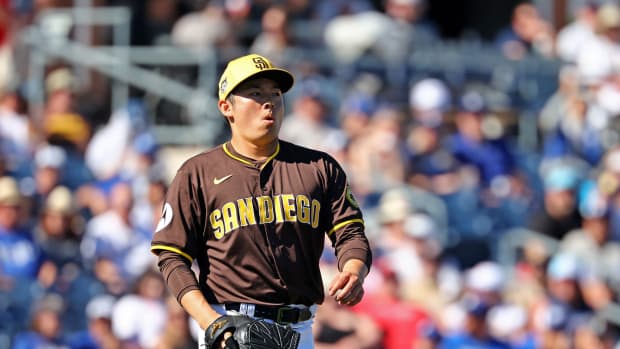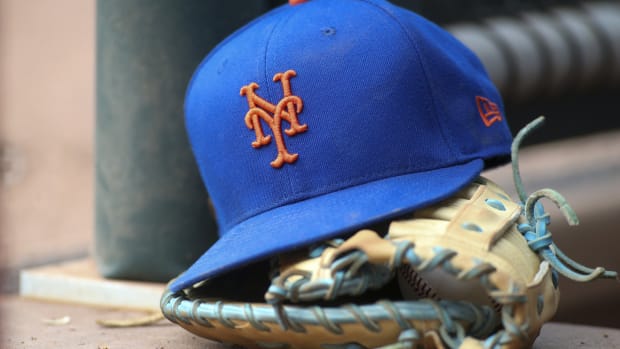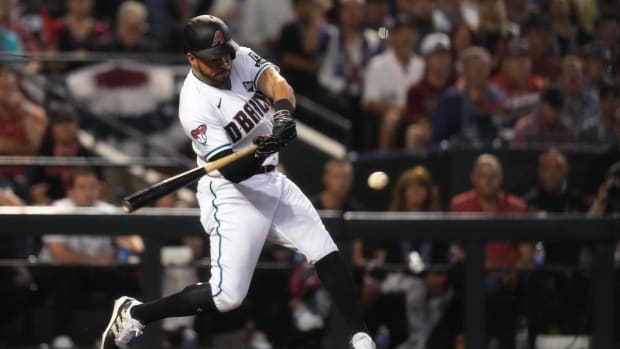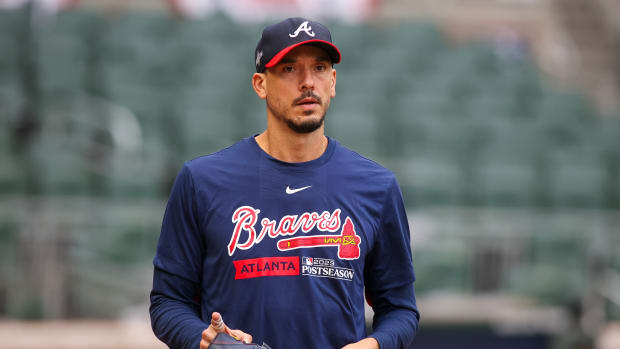Orioles' Buck Showalter, Nats' Matt Williams named Managers of Year
Buck Showalter of the Baltimore Orioles and Matt Williams of the Washington Nationalswere named Managers of the Year in the American and National Leagues, respectively, by the Baseball Writers’ Association of America Tuesday night.
Showalter joins Tony La Russa as the only managers ever to win the award, which was first given out in 1983, with three different teams and is the sixth manager ever to win the award thrice, joining Hall of Famers Bobby Cox and La Russa (four times each) as well as Jim Leyland, Dusty Baker and Lou Piniella (three each). Showalter previously won with the Yankees in 1994 and the Rangers in 2004. Williams, meanwhile, is just the fourth rookie manager ever to win the award, joining Hal Lanier of the 1986 Astros, Baker, who debuted with the Giants in 1993 and Joe Girardi, who won in his lone season with the Marlins in 2006.
Jose Abreu, Jacob deGrom deservingly win Rookie of the Year
Williams was the more surprising selection, as the Manager of the Year award is typically given to the skipper of the playoff team that most dramatically exceeds expectations. The Nationals, though, were favorites to win the NL East coming into the season, which they did. Still, Williams’ Nationals not only won their division, they did so by the largest margin of any of the six division winners (in part because theirs was the only division in which the second-place team finished below .500) while finishing with the best record in the National League at 96-66. That record was an exact match of Showalter’s AL East champion Orioles and a ten-game improvement over Washington’s 2013 finish. Williams is the second Nationals manager to win the award in the last three years, joining his predecessor Davey Johnson, who won in 2012 for leading the Nationals to their first division title.
•REITER: The top 50 MLB free agents
Prior to his hiring to replace the retired Johnson, Williams had extensive experience as a coach in the majors and minors, but had not managed a full championship season at any level. His managerial experience had been limited to a single season in the Arizona Fall League and five weeks as a fill-in at Double-A in 2007. His rookie season did not get off to a great start. His starting catcher, Wilson Ramos, suffered a broken hamate bone on Opening Day. Two weeks later, his starting third baseman, Ryan Zimmerman, fractured his thumb and before April was out he also lost young star Bryce Harper to a torn ligament in his left thumb. All of that happened while the team’s big offseason acquisition, right-hander Doug Fister, was also out due to a latissimus dorsi strain suffered during Spring Training.
Awards Watch: Alex Gordon, Yadier Molina among Gold Glove winners
Before Harper’s thumb injury, Williams made headlines by pulling his 21-year-old left fielder from a game for lack of hustle on a groundout despite the fact that Harper was nursing a sore quadriceps muscle in his left leg. Clearly attempting to make a statement to his team, Williams was unequivocal about his reasons for pulling Harper.
Whatever impact that assertion of Williams’ authority may have had on his team, it was likely undermined by the aforementioned injuries. Harper was back in the lineup the next day, but played just six more games before suffering his thumb injury. While Ramos returned on May 7 and Fister made his belated Nationals debut on May 9, the Nationals woke up on May 30 in third place with a record two games below .500.
From there through the end of the season, however, the Nationals went 70-39 (.642), tied with Showalter’s Orioles for the best record in baseball from that point through the end of the season. Washington did that despite the fact that Harper didn’t return until June 30 and spent his first month-plus back in the lineup in a slump, Ramos missed two more weeks in June due to a hamstring strain and Zimmerman, who returned on June 3, missed most of the second half due to a far more severe hamstring injury. Closer Rafael Soriano also pitched poorly enough in the second half (6.48 ERA, five blown saves in 15 opportunities) to prompt Williams to pull him from ninth-inning duty in early September. Altogether, Ramos missed 46 games, Harper 57 and Zimmerman 99.
AL East Hot Stove Preview: Can Orioles stay ahead of Yankees, Red Sox?
As for Showalter, he has been instrumental in turning the Orioles around since taking over as their manager in early August of 2010. The Orioles have had a winning record in each of the last three seasons, making the postseason twice. Prior to Showalter’s first full season at the helm (the O’s went 34-23, .596, under him to finish the 2010 season), Baltimore had gone 13 years without either a playoff berth or a winning season. Showalter finished a close second behind the A’s Bob Melvin in the 2012 AL Manager of the Year voting, receiving 12 first-place votes to Melvin’s 16. I thought the voters got it right that year, and I think they got it right again this year, with Showalter having substantially proven that the Orioles’ success under his stewardship has not been a fluke.
•VERDUCCI: How much do starting pitchers still matter?
Like Williams, Showalter had to cope with his share of injuries, most significantly the loss of All-Star catcher Matt Wieters to Tommy John surgery on May 11 and the two knee injuries which limited third baseman Manny Machado, arguably the team’s best player, to 82 games. Showalter also had to navigate the lousy performance of the team’s big offseason rotation addition, Ubaldo Jimenez (6-9, 4.81 ERA), which he did by employing an unconventional six-man rotation for part of the season. He did that with the help of general manager Dan Duquette and the fact that four of those starters — Kevin Gausman, Miguel Gonzalez, Bud Norris and Wei-Yin Chen — had minor league options remaining.
NL East Hot Stove Preview: Nationals try to hold off Mets, Braves, Marlins
Showalter also continued his success in getting unexpected star performances from seemingly marginalized players by keeping 31-year-old journeyman Steve Pearce in the lineup beyond fellow first baseman Chris Davis’ return from an oblique strain in mid-May. Around roughly the same time, he identified busted rotation prospect Zach Britton as his closer. Britton’s dominance helped the Orioles post the majors’ best record in one-run games for the second time in three years, with Baltimore going 32-23 (.582) in games decided by a single tally. Twelve of those wins came in extra innings.
Altogether, the Orioles made an 11-game improvement over 2013 and won their most games since 1997 despite those injuries. Showalter's club also overcame a crippling lack of production from second base (.216/.259/.360, 21 percent worse than the average production at the position per the park-adjusted OPS+) and a lousy performance from 2013 AL MVP candidate Davis, who missed the final 17 games of the season after being suspended for amphetamine use.
As with the other BBWAA awards, the ballots for Manager of the Year were submitted before the start of the postseason. Thus, Williams’ questionable decisions in the Division Series against the Giants — particularly pulling Jordan Zimmermann one out away from a 1-0 win in Game 2 and using rookie Aaron Barrett, not set-up ace Tyler Clippard or another veteran high-leverage reliever with the series-winning runs on-base in the seventh inning of Game 4 — are irrelevant here. The Orioles’ four-game sweep at the hands of the Royals in the American League Championship Series also did not affect the decision. Similarly, the postseason runs of the pennant-winning Giants and Royals were of no assistance to third-place finishers Bruce Bochy and Ned Yost. Full voting results can be found at BBWAA.com.


































